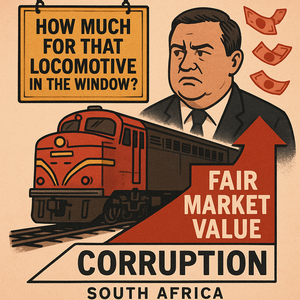My podcast colleague Mark Barnes often talks about the concept of “fair market value”, going so far as to suggest that there should be a unit to oversee FMV in the presidency or the auditor general’s office.
The reason is simple: a contract that is not in the realm of fair market value is a red flag. Actually, red flag is an understatement - rather, it is a violently puce flag of flaming fire and, of course, a leading indicator of corruption.
Neither is it a mere notion or some kind of rough estimate; it's used all over the place in business and accounting. FMV is the price a sensible buyer and seller would normally agree upon, assuming both have reasonable knowledge of the relevant facts and neither is under any compulsion.
It's used in tax law to help determine capital gains tax following the gain or loss on the sale of an asset. It is used in corporate valuations and, importantly, in mergers and acquisitions because it helps determine the price acquirers might pay for target companies. It's used a lot in litigation, including divorce settlements and insurance claims, for obvious reasons. FMV is used for insolvencies to determine distribution for creditors and even in employee stock options to set the strike prices. It's everywhere.
How do you determine fair market value? Well, like a lot of things in corporate finance, it's a bit of an art. In some cases, it's moderately easy: if the asset is listed, then generally the fair market value is the simple market value. The market could be wrong - the market probably is wrong. But it's by definition what buyers and sellers agree on, so it's hard to argue with and is deemed 'fair'.
Listed companies provide a guide for unlisted companies in the same area of trade. FMV, by comparison, is often an option. But you could discount the cash flow, or try to value the assets (tricky by doable). And if none of that works, you could agree on an independent appraiser.
But the point is that if you are a government agency and you are not doing FMV assessments, you are going to get ripped off. And when a government does pay significantly above FMV, it serves as a benchmark to detect price inflation or collusive bidding. Or corruption has occurred. Or someone has been really stupid.
The Zondo Commission heard face-rippingly, astounding examples of deals done way outside of FMV in SA during the State Capture period. The most egregious example involved Transnet when the R38.6 -billion locomotive deal swelled to R54-billion, a R16-billion unchecked escalation. The commission made the comment: “The escalation of the locomotive contracts by billions of rands was wholly unjustifiable and not supported by any objective cost or market assessment.” And later: “What is striking is how quickly and unquestioningly prices were inflated, and how procurement safeguards were ignored or dismantled.”
Executives at Transnet bypassed FMV benchmarks for a very obvious reason: to facilitate kickbacks of over R6-billion to Gupta-linked firms. Why, one asks with tears in one's eyes, has this case not yet come to court?
Of course, there were plenty of other examples. The R280-million Estina/Vrede dairy project was sold to the public as an empowerment initiative, yet produced barely any tangible output. It was an early victory for the Guptas.
There was also the R3.5- billion award made by Prasa (The Passenger Rail Association of SA) to Swifambo Rail Leasing, only to receive locomotives that were too tall for South Africa’s loading gauge, rendering them unusable. In this case, Zondo actually cited FMV, saying, “No effort was made to ensure that the prices paid were market‑related. The overriding objective was to enrich selected individuals.” I ask with tears in my eyes … sorry, getting diverted again.
The reason I am writing about this now is that none of this has gone away. Earlier this month News24 reported that a whole bunch of contractors Prasa hired to repair trains had overcharged by as much as 2,000%. The source was a report by law firm Webber Wentzel, which was commissioned in early 2024 to look into over-invoicing.
Loads of companies were involved; it seems as if the word got out that Prasa wasn’t doing, wait for it, any FMV investigation, so companies could invoice whatever they wanted.
I’ve been reporting on a case involving the Road Accident Fund (RAF), which, for some very dubious reasons, signed advertising contracts worth R1-billion, ostensibly to prevent road accidents. The full story is not out yet, but what we know now is that somewhere between half and three-fifths of the money has been spent.
So the RAF has an interest in reducing the number of road accidents, but there is another government agency specifically in charge of that: the Road Traffic Management Corporation (RTMC). Why is one agency taking over the functions of another? Who authorised that? Let me guess, with tears in my eyes...
Spending this amount of money in SA on advertising would result in almost total radio or television dominance for months on end. The contract with the two advertising firms for R500-million each is for five years, so that would suggest a spend of R200-million a year. For one million rand you would enjoy advertising dominance for months on a top national radio station.
Were these schemes fraudulent, or simply mindlessly reckless? In one sense, it doesn’t matter. The Public Service Act requires that government contracts should effectively apply FMV. Section 38(1)(b) of the Act says, "The accounting officer must ensure that the department, trading entity or constitutional institution has and maintains an appropriate procurement and provisioning system which is fair, equitable, transparent, competitive and cost-effective."
Until Fair Market Value becomes more than lip service—until it's enforced, audited, and penalised—South Africa will continue paying Ferrari prices for donkey carts, and the public will keep footing the bill. 💥
From the department of billionaires, weirdly spending sensibly ...

From the (literal) department of "shower thoughts" on Reddit ...



From the department of eating fun ...

Thanks for reading - please do share if you have a friend (or enemy!) you think would value this blog and ask them to add their email in the block below - it's free for the time being. If the sign-up link doesn't appear, you'll find it on the site.
Till next time. 💥




Join the conversation